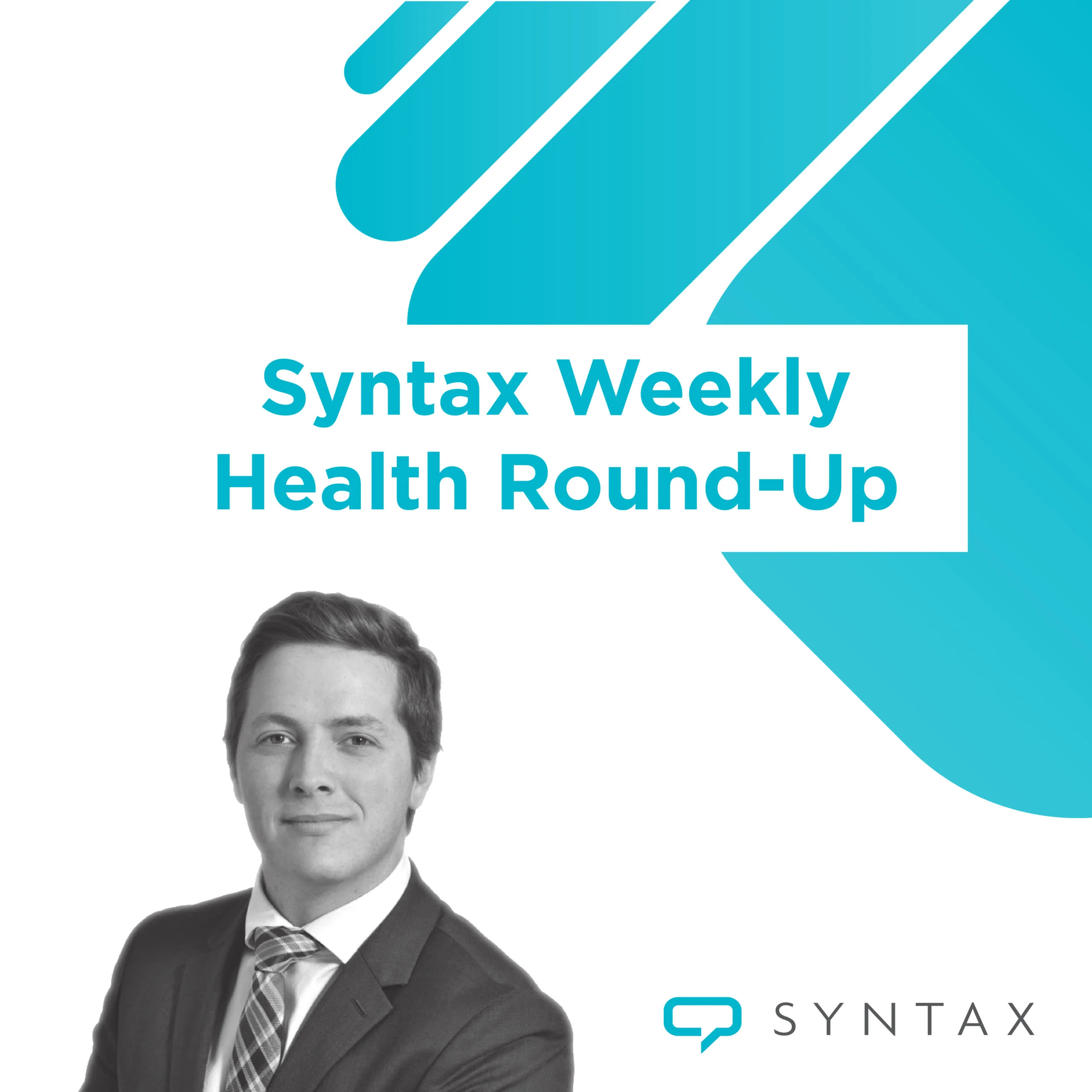Insights | Blog
Alberta Overhauls Its Health System
Canada’s Premiers gather to talk about healthcare as Alberta announces sweeping changes to its health system. On that, and more, here is your Syntax Weekly Health Round-Up.
On the Hill
- The House of Commons will be on break next week. When MPs return, they will begin to debate Finance Minister Chrystia Freeland’s Fall Economic Statement, which is to be read on Tuesday, November 21.
- The Standing Committee on Health met to continue consideration of long-awaited draft reports on its studies on children’s health (for which it’s been noted they are very close to finalizing) and the Patented Medicine Prices Review Board (for which further consideration will likely be delayed until the new year). The committee will soon continue with studies on women’s health, the opioid crisis, oversight of medical devices (breast implants), and an unfulfilled contract by the Public Health Agency of Canada (PHAC) with Medicago.
Around Government
- In recognition of National Pain Awareness Week, Health Minister Mark Holland and Mental Health Minister Ya’ara Saks released a statement summarizing actions taken to date to address issues of chronic pain for Canadians. This has included the establishment of the Canadian Pain Task Force, supporting initiatives like the launch of Pain Canada and the launch of the Power Over Pain Portal, and becoming the first country to develop a national pediatric pain management standard.
- Minister Holland announced an investment of more than $4.7M in the Health System Impact Fellowship program to support 11 PhD students and 27 postdoctoral fellows studying a wide range of health system priorities, from improving transitions in care and supporting the well-being of our health workforce, to advancing access to healthcare in rural areas and innovating long-term care.
Around the Dominion
- Canada’s Premiers gathered in Halifax this week, at the Nova Scotia Health Innovation Hub, where they shared thoughts on the importance of improving the efficiency and effectiveness of health systems across the country to enhance access to healthcare more broadly. Ultimately, however, not much was accomplished. There was little advanced on shared priorities, and the group did not discuss pharmacare, despite the federal government’s intent to table legislation this fall that would facilitate a framework for a national pharmacare program.
- The Government of Newfoundland and Labrador is establishing centres of excellence in aging at regional hospitals, which will lead to improved access to quality healthcare for seniors. The centres will include seniors-friendly services such as special attention to medication, special assistance from medical staff and mobility aids, and seniors-friendly emergency care (including medical staff with special training specific to older adults).
- The Government of New Brunswick announced an enhancement to the Insulin Pump Program to offer continuous glucose monitoring coverage to eligible diabetes patients. Under the program, coverage for continuous glucose monitoring is available to people who require intensive insulin therapy delivered by a pump or at least three daily injections. That coverage will extend to people of all ages who meet the criteria, and who meet the income-testing process.
- The Government of Ontario announced it is expanding the role of registered nurses to prescribe medications for certain conditions such as contraception, immunizations, smoking cessation, and topical wound care, starting in January 2024. Nurses will have to register to complete training in order to participate in the expanded role.
- While attending the Premiers’ Meeting in Halifax, newly minted Premier of Manitoba Wab Kinew expanded on his government’s priorities for addressing the healthcare shortage, including by creating direct lines of communication between workers at the bedside and government leaders.
- The Government of Saskatchewan passed Bill 147 which amends The Tobacco and Vapour Products Control Act to increase the minimum age for tobacco and vapour product purchase from 18 years of age to 19. The change aligns age restrictions for smoking and vaping with existing restrictions on liquor and cannabis sales in Saskatchewan. Most provinces have harmonized the age restrictions for the legal purchase of alcohol, cannabis, tobacco, and vapour products in their jurisdiction. The province also announced a one-time stabilization funding of $20 million to community-based fee-for-service family physicians in Saskatchewan. The transitional measure is intended to build capacity for physicians to eventually adopt a new made-in-Saskatchewan family physician payment model based on blended capitation.
- In a move that was tipped off by NDP Leader Rachel Notley on X (formerly Twitter), Alberta Premier Danielle Smith announced the government is dismantling its provincial healthcare-delivery organization into four entities that will be overseen by a council of politicians and senior government bureaucrats. The goals of the reform are to reduce emergency room and surgery wait times, improve access to innovative treatments, and recruit more staff.


